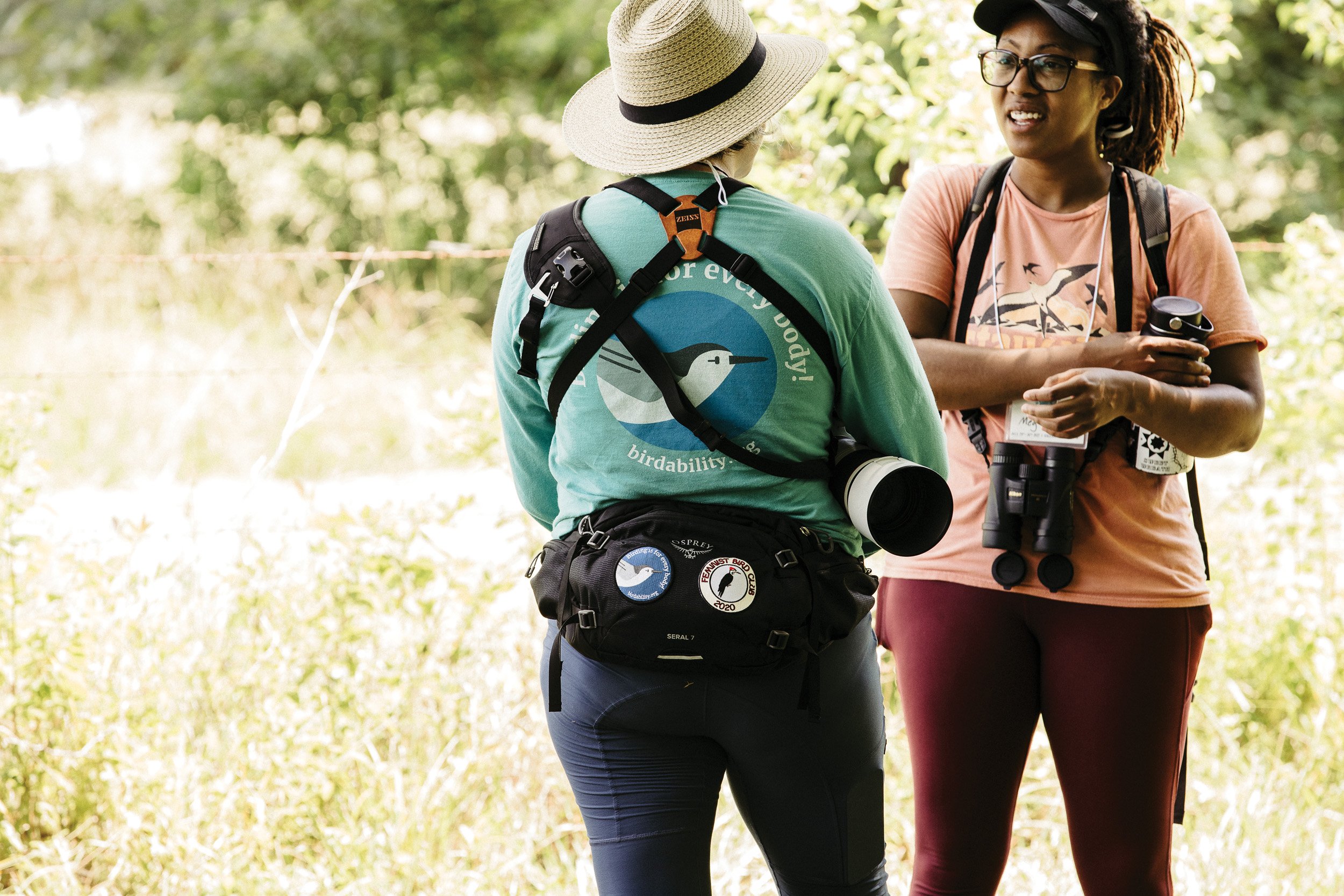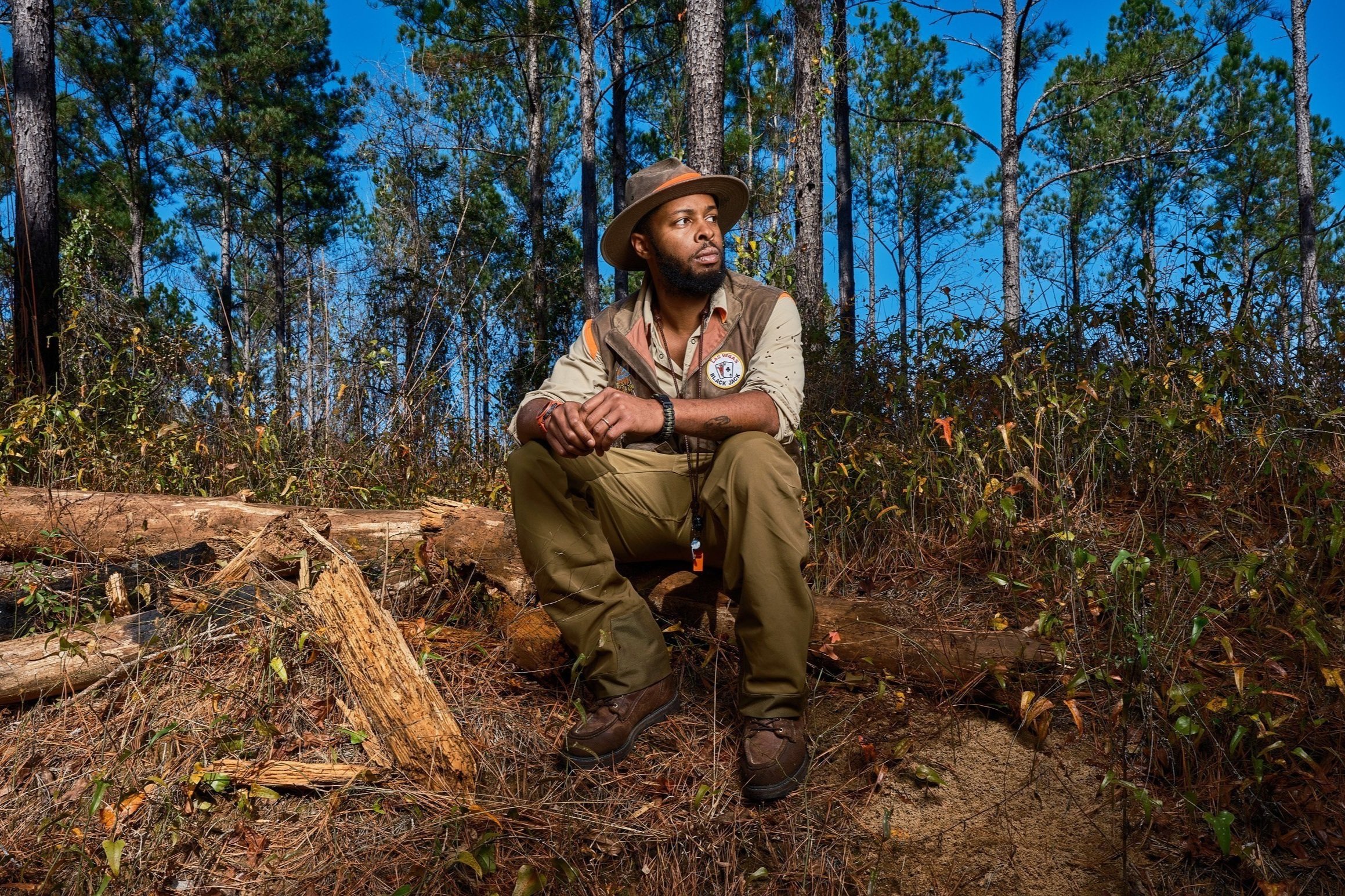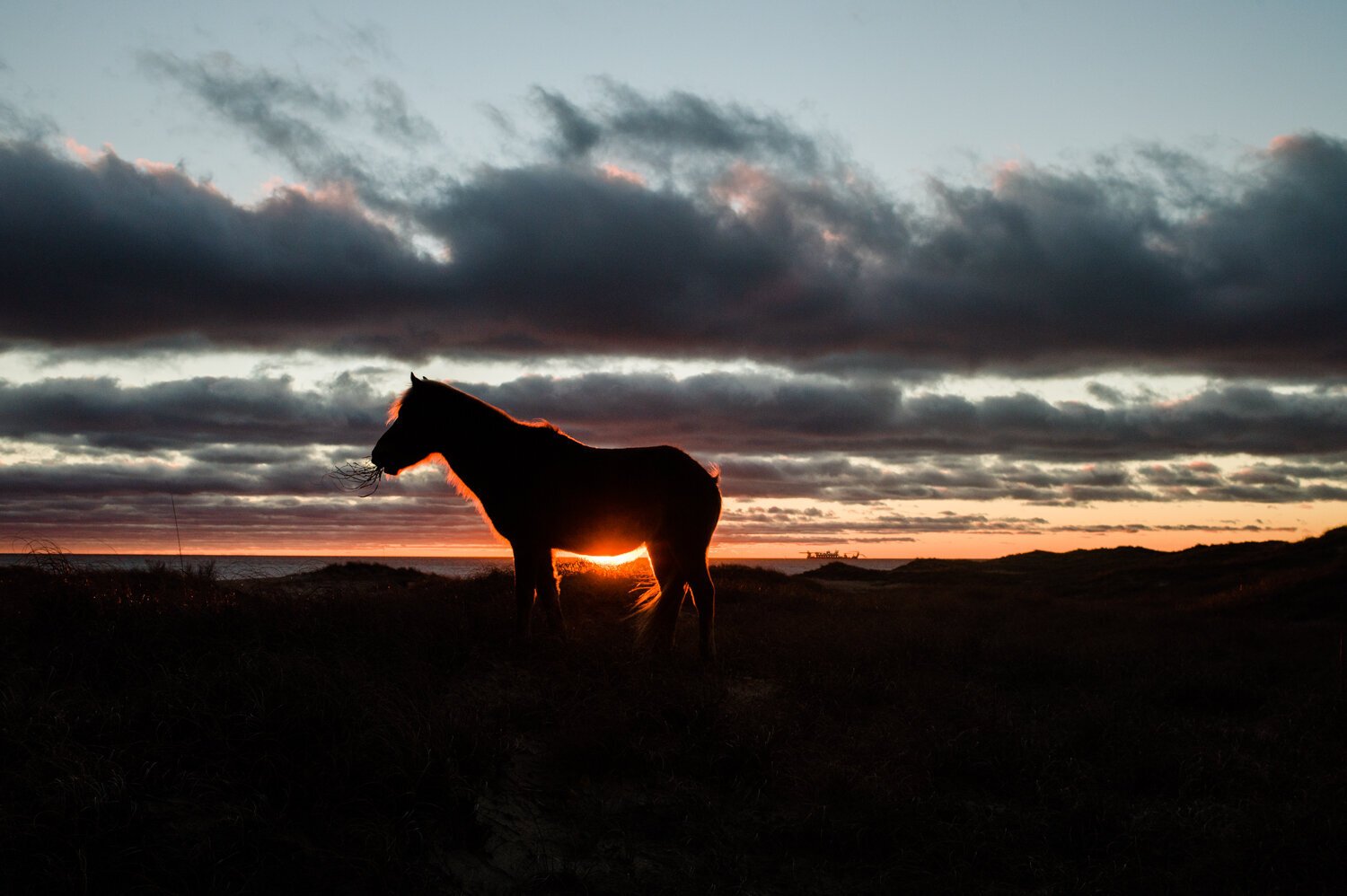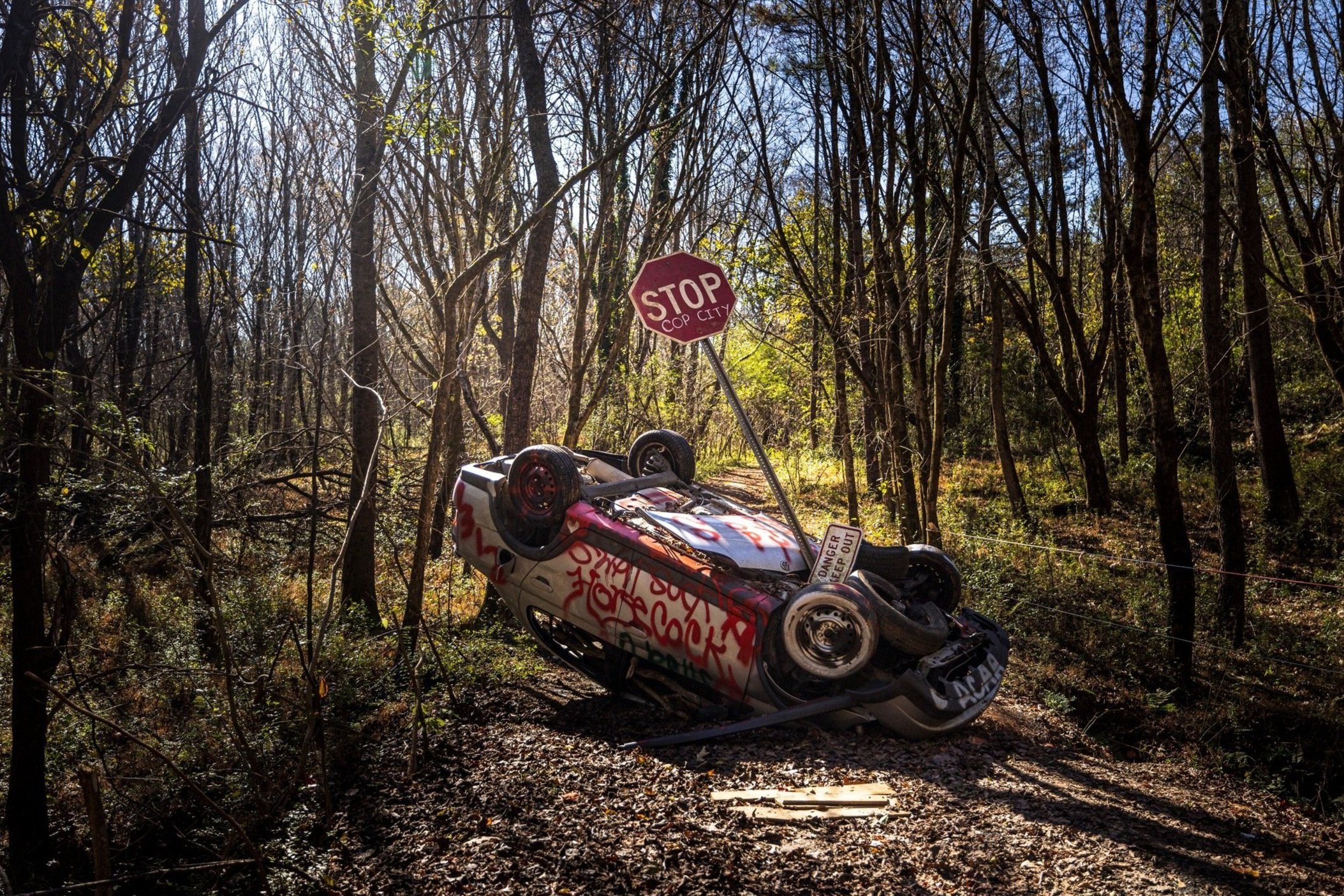As a kid enjoying his family farm in Alabama’s Black Belt — its fields, shady woodlands, and babbling creek — Christopher Joe didn’t realize how lucky he was. He now knows that for too long, too many have been excluded from uplifting experiences in the outdoors. Today, with his bird-watching business, he’s made it his mission to welcome everyone into the wonders of nature while shining a light on the riches of his home region.
Story by Jennifer Kornegay | Photos by Wes Frazer
January 17, 2023
By 9 a.m. on a Saturday in late July, despite a pale gray blanket of clouds blocking the worst of the sun, the temperature in Newbern, Alabama, deep in the state’s Black Belt region, is scorching. Still, people keep arriving at The Joe Farm, spying the sign from the county road and slowing to park on the shoulder. With a huge smile claiming most of his face, Christopher Joe yells and waves, greeting people with hearty handshakes or hugs and moving through the groups like a party host. There are old people. Young people. Folks from a few miles down the road and farther away in the state. People from Michigan, Mississippi, Arkansas, Georgia, North Carolina, Tennessee, and Vermont. All dressed in sensible shoes and wide-brimmed hats, with binoculars or cameras (or both) hanging around their necks, they turn their faces up and intensely search the skies when detecting the slightest movement overhead.
These birders have come to The Joe Farm as attendees of Alabama Audubon’s Black Belt Birding Festival for a show promising to provide “all kinds of kicks and thrills.” Nearby, Christopher's dad, Cornelius, starts to cut hay in one of the farm’s pastures, and the whirring blades dragging behind his tractor scare up a smorgasbord of insects. Set up a big bug buffet, and the birds — specifically, swallow-tailed and Mississippi kites — will come. It’s an offering distinct to Christopher’s Connecting With Birds and Nature Tours business. “We bring the birds to the people,” he says.
A third-generation Black farmer, Christopher Joe’s love of the land and his desire to keep it in the family inspired him to meld the verdant acreage with the ethos and enjoyment of bird-watching. He is also a district conservationist with the Natural Resources Conservation Service.
Depending on who is defining it, the Black Belt is a collection of 12 to 21 counties in central Alabama (south of Birmingham), but the entire region earns its name from the rich, fertile soil that made agriculture its dominant industry for decades. The western portion of this region, including Hale County, home to The Joe Farm, spreads out as a largely rural landscape where the population is predominantly Black. Stands of tall loblolly pines and old, broad-branched hardwoods break the oceans of grass covering flat fields and rolling hills. It’s heavy with idyllic scenes, but despite this natural richness, these counties remain just as weighted by poverty.
Cotton once blanketed much of the region — a crop that depended upon enslaved labor. Even after slavery was abolished, Black people who stayed were shackled by Jim Crow policies that denied them access to decision-making power. Soon after, many of the Civil Rights Movement’s most pivotal moments played out in the Black Belt, including the infamous “Bloody Sunday” crossing of the Edmund Pettus Bridge — a dark day seen around the world that would eventually catalyze the passage of the Voting Rights Act.
Yet plantation culture’s racist legacy has trickled down, contributing to today’s lingering disenfranchisement, ranging from economic to educational to environmental. The hope that the Black Belt can be fertile ground for a different future keeps and attracts people wanting to drive positive change. One of those people is Andrew Freear, director of Rural Studio, a team of Auburn University School of Architecture faculty and students. The team has been living and working in Hale County for close to 30 years to address the shelter needs of the underserved area by designing and building homes that are sustainable and affordable as well as beautiful, plus parks and other public spaces.
“There are success stories here now,” Freear says. “There are issues, but there are so many role models, remarkable locals with big hearts, who are rising above it all.” People like Barbara Williams, the librarian at Newbern Library, who, though retired, has transformed a country library into a vital community center with a slate of engaging kids’ programs. There’s also Emefa Butler, a Black Belt native and founder of C.H.O.I.C.E., a Uniontown nonprofit that builds bridges between a variety of needs and available resources. “Emefa’s a real rock star,” Freear says. “She left and came back home to do this work.” Or Sarah Cole in Greensboro, whose for-profit eatery Abadir’s exists to support her fledgling nonprofit, the Black Belt Food Project, which is using nutrition education to better the region’s health outcomes.
A festival attendee trains his binoculars skyward in hopes of a kite sighting. Both Mississippi kites and swallow-tailed kites often flaunt their aeronautic (and predatory) skills over the farm.
A third-generation Black farmer, Christopher Joe raises Black Angus cattle with his father on the family’s 200 acres. He’s also a district conservationist with the Natural Resources Conservation Service, an agency under the USDA. “Farming is hard to do today full time. It’s almost impossible to cover the costs without another job,” he says. His dad was a schoolteacher for years to help fund the farm. Christopher’s love of the land and desire to help keep it in the family drove the formation of his bird-watching business.
“He’s changing the narrative about what this region is and can be,” Freear says. “He’s one of many with deep roots who love where they came from and are contributing to its future.”
Despite the challenges in farming and other issues in the region, letting go of the farm has never been an option for the Joes. But now, Christopher has given so many others a reason to hold on to this place, too.
Birders share stories during their visit to The Joe Farm.
Family ties pull strong among the Joes; they’ve all shown up to help with the festival. In addition to his dad, Christopher’s wife and young daughter, his two brothers, his sister, and his sisters-in-law are on site, manning the registration table and handing out name tags. When Christopher’s nieces and nephews aren’t goofing off on the walkie-talkies, they’re helping notify the Joe team about latecomers who need a ride to the pasture and, every now and then, sounding the alert on a “cool bird” en route.
Leola Joe, family matriarch, leaves no question as to her role. “Read it,” she says, turning around to show “Mama Joe” printed on the back of her Joe Farm-branded T-shirt. She’s keeping folks fed and hydrated, handing out snacks. “Eat, and drink your water!” she admonishes, dropping plump ripe strawberries into outstretched hands.
“Knowing that people come from all over to see what we have done on family land as a family and that they see value in what we’re doing is rewarding,” Leola says. “It makes me feel like I am making the most of this land and my family legacy.
“We are down here in the Black Belt, and we’ve got people from all over the U.S. coming to see us; that’s something,” Leola continues. “But seeing my kids and even my grandkids all together, helping each other, that’s special. They’ve been tight since childhood.”
A young member of the Joe team keeps an eye out for “cool birds.”
Connecting With Birds and Nature Tours began when Christopher took a deeper look around the farm in 2018. He had long admired the diverse birdlife taking flight from the fence lines and soaring above the fields, but he didn’t give the feathered flyers overhead much thought until he began searching for a way to add another revenue stream to the farm. “It was just a simple idea to start. I wanted to diversify our land use,” he says. “Birding came up as a possibility, and I hooked up with Alabama Audubon to find out more.”
He reached out to Alabama Audubon, but they already knew the Joes’ land, telling Christopher they’d been stopping on the nearby road for years to watch kites fly in to feast as Cornelius cut hay. Now the chore is the farm's signature birding experience and marks the Joe family’s entrance into the ecotourism market.
“The message we're sending is, you can take things you already have, add a little something to it, or just see it and market it in a new or different way, and you can do more with it. That’s what I’ve done here,” Christopher says. “And it’s working. Bird-watching reaches so many types of people from all over the country. They come to us because we have multiple habitats on this one property, so they can see a variety of birds in one spot.” This year, 121 people out of the 170 total festival attendees registered to visit The Joe Farm.
Laryssa Ferrara-Drane, a bird keeper at the Birmingham Zoo and a festival first-timer, agrees with Christopher's assessment. “Birding is a big-money industry, so it’s cool to see some of that coming here. And I think it’s resulting in a wider acknowledgment of and appreciation of this area’s important history.
“We're showing people, some from pretty far away, that we have something here maybe they didn’t expect, and then they look around to see what else is here,” Christopher says. “They come for the birds [and] get exposed to the powerful Civil Rights stories that unfolded throughout the Black Belt. We’re all better for more people understanding those things.”
Along with birds, Christopher Joe’s focus is on sustainable land management, a tenet he’s sharing with other area farmers. Cornelius Joe mows a pasture into a hoped-for “kite bonanza.”
Since Christopher began the birding business, he’s shown tour groups and festival-goers multiple birds: the usual suspects like bluebirds, woodpeckers, and mockingbirds; fan favorites like red-tailed hawks, white ibis, and great egrets; more sought-after specimens like wood storks, bald eagles, and scissor-tailed flycatchers; and the stars of the Black Belt skies, kites, both the stunning swallow-tailed kite, its bright white body accented with black-tipped wings and forked tail feathers, and its cousin the Mississippi kite. With reliably good sightings, The Joe farm has garnered a reputation as one of the most popular and rewarding Black Belt Birding Festival outings.
Before donning his straw cowboy hat and revving up his John Deere tractor to start this year’s event, Cornelius makes some claims. “We're going to have a great day today, a great time. And it will not rain,” he says, casting his eyes up to acknowledge the gray above and the forecast everyone’s been a bit anxious about. He sets off for the field that’s serving as stage for the “kite bonanza.” A few minutes later, Christopher hops in the driver's seat of another tractor and encourages the crowd to start filing onto the open trailer hitched behind it. “You can walk over if you want, but I’d take the ride!” he says. Some still mill around under a tent where Christopher’s brother Timothy is chatting about his art, paintings of owls, songbirds, and the beloved kites. The first group climbs in and takes seats on hay bales. Christopher’s other brother, Cornelius Jr., a chef in Huntsville, Alabama, directs folks who decide to walk.
Almost an hour later, Cornelius is still driving his tractor, methodically turning at each corner of the square pasture, steadily expanding the amount of shorn grass. A few junebugs and grasshoppers jump up. The dragonflies — the kites’ favorite food — fly in full force. Yet no kites have shown up to eat.
Some birds have been sighted. “There! There!” Calls ring out, stopping people in mid-conversation. Heads are thrown back. Binoculars snap to eyes. “Vulture.” Next, a flock of long-necked anhingas. Then, a bald eagle. With every bird glimpsed and then identified as “not a kite,” there’s a faint ripple of disappointment. It’s getting hotter by the minute — the sun unobscured, cooking foliage and flesh.
Danny Brown of Homewood, Alabama, isn’t bothered. “That’s birding. You can’t make things happen. And there’s still time,” he says. “The kites are so agile and have such great speed,” he says. “Watching them eat on the wing [consuming their just-caught meal midair] is something else; you don't see many other birds do that.”
“It’s not a problem to me, not seeing tons of kites. Just being out here in this beauty gets me,” says Ariana Remmel, flocked in bird tattoos — an owl tucked behind one ear, a ruby-red male cardinal on their left calf, and a less showy female on the right. “Birds are important, but they’re often the gateway to learning about an entire ecosystem. And the people I meet doing this are so great; this community of birders is really welcoming, and that’s a big part of the joy in this.” For Remmel, a gender non-binary person who traveled from Little Rock, Arkansas, for the event, the acceptance they have found on the farm serves as a refuge and evidence of a shift in the birding world.
Joe Watts, an Alabama Audubon board member, might be the image most conjure when they think “bird-watcher”: a middle-aged white man. But he echoes Remmel as he squints under the brim of his hat against the midday sun. “The birding space is changing, growing more inclusive, and we’re seeing more younger birders, more nonwhite birders, which is great,” he says. “I’ve been into this for a while, and it’s fun to see others get into it, too.”
Matriarch Leola Joe makes sure everything runs smoothly as farm visitors concentrate on the skies.
Christopher never knew about “Black birders,” an expanding force with a growing social media presence, until he was already a birder. “I’d never heard of specifically Black birders, but they’re out there, and what they do, what they communicate, is needed,” he says. With events like the national Black Birders Week aimed at celebrating birding in Black culture, the group is making a difference, according to Christopher. “Just in my time, I’ve seen birding get more diverse, and it’s cool to see younger birders, more Black folks, and especially the combo, young Black kids, discovering the wonders of this.
“When it comes to outdoor hobbies, like birding or hiking or camping, for so long the places to do that, state lands and parks even, were not accessible to Black people,” he continues. “So still today, a lot of Black people don’t have a high comfort level being in those places. How is a kid supposed to get into nature if they’ve never been in it, or if they go there, they’re run off? I’ve always had places to explore and be outside. I have the farm. But I know a Black lady who went to a park in Georgia to bird and was followed around by a white couple obviously suspicious of her being there. This wasn’t in 1965; this was last year.”
The incident rings reminiscent of a national news story in 2020 about a white woman falsely accusing Black birder Christian Cooper of threatening her and her dog in New York’s Central Park.
While Christopher has created a safe space for people of color to immerse themselves in the outdoors, that wasn’t the original intent. “I didn’t think about that part too much in the beginning, but once we opened the gates, and we heard these stories, I realized how much this matters,” he says. “Now, ensuring everyone feels welcome is a priority.”
Meg Ford, a young woman on the day’s excursion, worked for Alabama Audubon and lived in Greensboro until recently, She knows that environments like the one Christopher has created at the farm are far from the norm in the birding world. “There are some snobs out there; birding can be a little gatekeeper-ish, depending on the group you’re with, but that’s not Christopher. You don’t have to be an expert birder to come here and enjoy this,” she says. “You can ask questions. He loves sharing knowledge.”
“You have your snooty-tooty birders, for sure,” Christopher adds, “but I’m like, ‘Y’all come on!’ We’ll figure it out together.”
Their abiding avocation evident in their body art, Ariana Remmel traveled from Little Rock, Arkansas, for the festival. “Birds are important, but they’re often the gateway to learning about an entire ecosystem. And the people I meet doing this are so great; this community of birders is really welcoming, and that’s a big part of the joy in this.”
Historically, birding requires walking, sometimes for long distances and over uneven terrain, which can exclude disabled people from birding expeditions, but for Freya McGregor, who works with Birdability, an organization increasing access to birding, Christopher has also structured the outings in a way that includes those with mobility issues, as well as people who are deaf or blind or have intellectual or developmental disabilities. “There are so many other ways besides the classic bird walk to enjoy birding, and that’s what we do, what I’m really passionate about,” McGregor says. She hooks a thumb under her camera harness to foist forward one of the many buttons pinned to it. Birding Is for Everybody! it reads. “That’s our tagline.” The current outing offers a stationary experience, where Cornelius cuts hay to “bring the birds” to those typically left out of a traditional watching experience.
Other Joe Farm birding tours are conducted via the trailer outfitted with hay bale seats, which also sports a spring-loaded ramp that accommodates wheelchairs. “We’re on a farm; it’s not ADA compliant, but it still meets so many access needs,” McGregor says. “There is an open invitation here; Christopher’s attitude, his methods, they all say, please come! We want you, whoever you are, here. And that catches on. The more we encourage inclusivity, the better for all, for disabled birders, Black birders, gay birders, Black gay birders, just everybody.”
Binoculars and cameras at the ready, birders from as far away as Vermont enjoy beauty on the wing at the 200-acre Joe Farm in Newbern during Alabama Audubon’s popular Black Belt Birding Festival.
It’s about 11:30 a.m. An hour ago, a kite was spotted soaring high in the sky, turning lazy circles, but finally, the first kite to make a move for a meal arrives; it’s a Mississippi. “Here he comes!” Shouts and extended arms with fingers pointing go up, almost in unison, as the birders spot the sleek gray raptor with sharp-pointed wings. He’s coming down lower, stopping his high-altitude coast and furiously flapping his wings a bit to start a run over the pasture. He has his head angled downward, scanning for the tiniest insect movement. He swerves, he dips, he rolls and hangs a hard right.
“Whoa! It’s like a ‘Top Gun’ jet,” Christopher says. “This guy’s the Maverick of the bird world!” Watching the scene through the telephoto lens of his camera, he delivers a play-by-play of the action unfolding. The acrobatic bird makes a strike. “Is he gonna go? Yes. Go, bird!” The kite quickly tucks his wings for a fast dive right on target. He bags his lunch. Others chime in. “Way to go, bird!” “Yeah!” While everyone stands in awe, it’s Christopher — who’s seen it more times than anyone here — bouncing with contagious excitement, enlivening those who’ve begun to wilt.
Christopher and his dad are also sharing wisdom gleaned from these experiences, teaching other area farmers the sustainability-focused land management practices that have helped create and maintain the conditions on the farm that benefit birds, their cows, and other wildlife, too: bobcats, deer, rabbits. Christopher says that they don’t use any chemicals to kill plants, but bushhog instead — using a type of rotary mower attached to the tractor that trims weeds and mows grazing paddocks and hayfields. The Joes are also teaching classes for other cattle farmers on the importance of soil health and clean water.
“The impact the Joe family is having on this area includes conservation,” says Alabama Audubon’s Watts. “Leaving some acres wild, protecting habitat, that’s important, too.”
“The birds were here, but we’re making sure they stay and, for some, that they keep visiting,” Christopher says. “I’m so awed by them. I love watching them do their thing.”
The entire Joe entourage has a hand in the family’s Connecting With Birds and Nature Tours business.
As the outing winds down, the gathering at The Joe Farm feels more like a family reunion. As McGregor and Ford head out, they make plans with Remmel to grab some lunch. Some who met only hours before are already talking about the next meet-up at festival events later in the day.
“When we talk about being welcoming, that’s Southern hospitality, really, and that’s the thing. That’s what we’re doing here,” Christopher says. “I love having visitors from up North who come down here with a preconceived notion of the South. They get here and see how it really is, how we are, and you can see the stress roll off them. Next thing you know, they’re back in the trailer, all these strangers talking, exchanging numbers, taking selfies. That is exactly what I want this to be. Birds are really just a conduit for that connection.”
Jennifer Kornegay is a freelance writer and editor living in Montgomery, Alabama. Her article on boucheries that appeared in The Local Palate was featured in The Best Food Writing of 2017. She’s written for The Bitter Southerner, Garden & Gun, Southern Living, Conde Nast Traveler, Modern Farmer, and other publications. She can be reached at @jenniferkornegay on Instagram or through her website, jenniferkornegay.com.
Wes Frazer enjoys traveling, fly fishing, going to estate sales, and playing with his dog, Ralph. In addition to making photographs, he co-owns a bar in Birmingham called Mom's Basement.
















